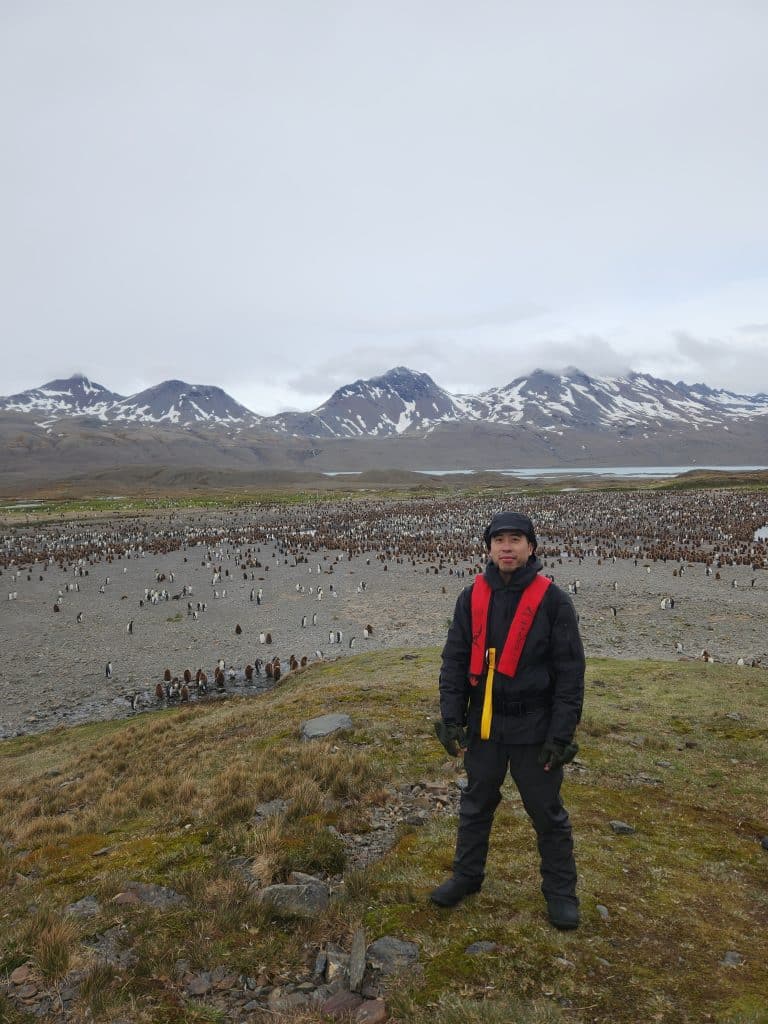Step into the frozen expanse of Antarctica through the lens of Hong Kong-based Earth.Org photographer Edwin Lee as he unveils a chilling photo story that exposes the heart-wrenching consequences of a rapidly spreading outbreak of avian flu that has decimated seal populations in recent months and is now beginning to spread to penguins. Edwin’s captivating images provide a sobering glimpse into the devastating toll this disease has taken on the continent’s delicate ecosystem and its remarkable inhabitants.
—
In November 2023, I was commissioned by a travel agency to film promotional material for their luxury Antarctica cruises. Starting from the port town of Ushuaia in Argentina, our 19-day journey stopped at the Falkland Islands, South Georgia, and finally the Antarctica Peninsula itself, located at about 1,300 kilometers (800 miles) to the south.

Cruises like this one are experiencing a boom in popularity thanks to new expedition lines and in part due to the post-pandemic trend of “revenge travel,” particularly to exotic locations.
After we left the Falkland Islands toward South Georgia, both British territories, the news of the progression of H5N1 – a contagious and highly pathogenic avian flu strain – slowly dawned on us. The virus had started to creep into this sub-Antarctic region.
My hometown Hong Kong isn’t new to this strain. It is there that the first-ever outbreak of this avian flu strain originated in 1997, spreading to poultry and 18 individuals, six of whom died. New outbreaks in 2001 and 2002 resulted in the death of several avian species and led to a massive cull of poultry. A year later, another person succumbed to the disease.
Understandably, there was a lot of apprehension when our ship arrived in South Georgia, as cruise ship crew and passengers feared a potential encounter with dead birds or penguins. Unlike the Falkland Islands – which is inhabited by just over 2,800 people – South Georgia is a designated Marine Protected Area and lacks a permanent population.
One unique aspect of our cruise voyage is its ability to facilitate landings on shores without the need for a port. With the use of “Zodiacs” – military-standard speedboats – passengers can be transported to rather inhospitable areas to get a chance to observe wildlife up close. However, whether we could land or not depended exclusively on daily rules set by the South Georgian government and the International Association of Antarctica Tour Operators (IAATO).



As feared, H5N1 had been spreading around the islands, leading to the closure of many landing zones to prevent the spread of the disease to humans. During our four days around South Georgia, we were only permitted to land once at a penguin colony on Fortuna Bay on the northern side of the island. This involved strict biosecurity measures such as disinfecting clothing and maintaining a two-meter distance from all wildlife. The following day, authorities shut down Fortuna Bay due to the threat of an incoming H5N1 wave.
According to one of our expedition guides, South Georgia is now being omitted from cruise itineraries altogether following the closure of most landing zones by local authorities.

As a consolation, our cruise company subsequently organized Zodiac trips along the coastline, allowing us to observe wildlife from a reasonable distance. These images were taken from the Gold Harbour beach in South Georgia.
Here, I witnessed the devastation of avian flu firsthand. Rows of dead seals lined the entire beach, while some carcasses were swept into the ocean. Curiously, the virus had only affected seals and not penguins. At least until then.



In recent days, the Scientific Committee on Antarctic Research (SCAR) identified 35 potential cases of H5N1 avian influenza virus among gentoo penguins, a species native to sub-Antarctic islands, with 14 cases being confirmed so far via PCR test. According to Reuters, the Falkland Islands government has identified “over 200 dead chicks alongside a handful of adults” and was awaiting test results from rockhopper penguins as it prepared “for a large-scale outbreak.”


You might also like: Antarctica’s Floral Awakening: How Climate Change is Transforming the Continent’s Ecosystem


















